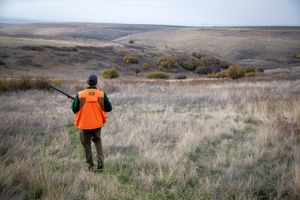
News
October 25, 2025
Ain't nothing like the real thing: Officials warn against using AI for hunting regs - Fri, 24 Oct 2025 PST
There’s at least one thing artificial intelligence isn’t ready to replace.
**Officials Warn Against Using AI for Hunting Regulations**
As hunting season rapidly approaches, state wildlife officials are issuing a strong warning to hunters: don't rely on artificial intelligence for information about hunting regulations. While AI has made impressive strides in recent years, experts emphasize that it's still no substitute for official, human-verified sources when it comes to understanding and adhering to complex hunting rules.
The concern stems from the potential for AI systems to provide inaccurate, outdated, or even completely fabricated information. Hunting regulations can be intricate, varying by species, geographic location, time of year, and even specific hunting zones. These rules are frequently updated to reflect changes in wildlife populations, conservation efforts, and environmental conditions. An AI, especially one trained on older datasets or unreliable sources, could easily misinterpret or misrepresent these regulations, leading to unintentional violations.
"We understand the appeal of using AI for quick answers," stated a spokesperson for the Department of Fish and Wildlife. "But when it comes to hunting regulations, accuracy is paramount. A simple mistake could result in hefty fines, the loss of hunting privileges, or even harm to wildlife."
The warning comes after several anecdotal reports surfaced of hunters testing AI systems for information, with results ranging from mildly inaccurate to demonstrably false. In one instance, an AI chatbot incorrectly stated that a specific hunting zone was open for deer season, when in reality it was closed for conservation purposes. In another case, an AI provided outdated bag limits for waterfowl, potentially leading hunters to exceed legal limits.
Officials are urging hunters to consult official sources such as the Department of Fish and Wildlife website, printed regulation booklets, and direct communication with wildlife officers. These sources are regularly updated and maintained by experts who are intimately familiar with the nuances of hunting regulations.
"We encourage hunters to be responsible and informed," the spokesperson continued. "While AI may have a place in the future of hunting, it's simply not reliable enough to replace the expertise and accuracy of human-verified information. Your safety, the safety of others, and the health of our wildlife depend on it." Hunters are also encouraged to attend informational sessions and workshops offered by the Department to stay up-to-date on the latest regulations and best practices.
As hunting season rapidly approaches, state wildlife officials are issuing a strong warning to hunters: don't rely on artificial intelligence for information about hunting regulations. While AI has made impressive strides in recent years, experts emphasize that it's still no substitute for official, human-verified sources when it comes to understanding and adhering to complex hunting rules.
The concern stems from the potential for AI systems to provide inaccurate, outdated, or even completely fabricated information. Hunting regulations can be intricate, varying by species, geographic location, time of year, and even specific hunting zones. These rules are frequently updated to reflect changes in wildlife populations, conservation efforts, and environmental conditions. An AI, especially one trained on older datasets or unreliable sources, could easily misinterpret or misrepresent these regulations, leading to unintentional violations.
"We understand the appeal of using AI for quick answers," stated a spokesperson for the Department of Fish and Wildlife. "But when it comes to hunting regulations, accuracy is paramount. A simple mistake could result in hefty fines, the loss of hunting privileges, or even harm to wildlife."
The warning comes after several anecdotal reports surfaced of hunters testing AI systems for information, with results ranging from mildly inaccurate to demonstrably false. In one instance, an AI chatbot incorrectly stated that a specific hunting zone was open for deer season, when in reality it was closed for conservation purposes. In another case, an AI provided outdated bag limits for waterfowl, potentially leading hunters to exceed legal limits.
Officials are urging hunters to consult official sources such as the Department of Fish and Wildlife website, printed regulation booklets, and direct communication with wildlife officers. These sources are regularly updated and maintained by experts who are intimately familiar with the nuances of hunting regulations.
"We encourage hunters to be responsible and informed," the spokesperson continued. "While AI may have a place in the future of hunting, it's simply not reliable enough to replace the expertise and accuracy of human-verified information. Your safety, the safety of others, and the health of our wildlife depend on it." Hunters are also encouraged to attend informational sessions and workshops offered by the Department to stay up-to-date on the latest regulations and best practices.
Category:
Technology